WORDPRESS
9 Best WordPress Community Plugins To Boost Your Engagement in 2023

If you want to improve your website’s engagement rate, why not download the best community plugin for WordPress?
Improving engagement correlates to better user experience, traffic, search rankings, and revenue. More importantly, it also helps build a sense of community and leads to a more loyal audience.
To achieve all these, you must use a community plugin that suits the needs of your WordPress website.
Thankfully, this article will discuss the best community plugins for WordPress. We’ll discuss what makes them great community plugins relative to their features and plans.
This way, you can get your hands on the right plugin to help improve your engagement rate with your community.
9 Best WordPress Community Plugins
Here is our curated list of WordPress plugins to use when building an online community.
Hope you find what you’re looking for!
MemberPress
MemberPress is a popular choice for the best community plugin for WordPress. It’s for those looking to create a membership website on WordPress. It’s easy to use and comes with a robust feature set.
With MemberPress, you can restrict access to content on your site to paid members only. You can also create subscription plans and discount codes. Plus, you can manage your members through an intuitive dashboard.
The plugin also works with many popular payment gateways. The list includes PayPal and Stripe. As a result, it’s easy for you to set up a secure and reliable way to accept payments from your members.
Features
- Subscription plans – It lets you create and manage subscription plans for your members. And these come with options for different pricing tiers and recurring billing.
- Content access controls – MemberPress includes tools for controlling content. It also restricts access to specific pages, posts, and categories.
- User profiles – It features user profiles. As a result, it lets users share information about themselves and communicate with other users.
- Reporting and analytics – MemberPress includes many reporting and analytics tools. And it lets you track your membership site.
- Integration with WordPress – It works seamlessly with the rest of your WordPress site. And you can customize it with WordPress themes and plugins.
Pricing
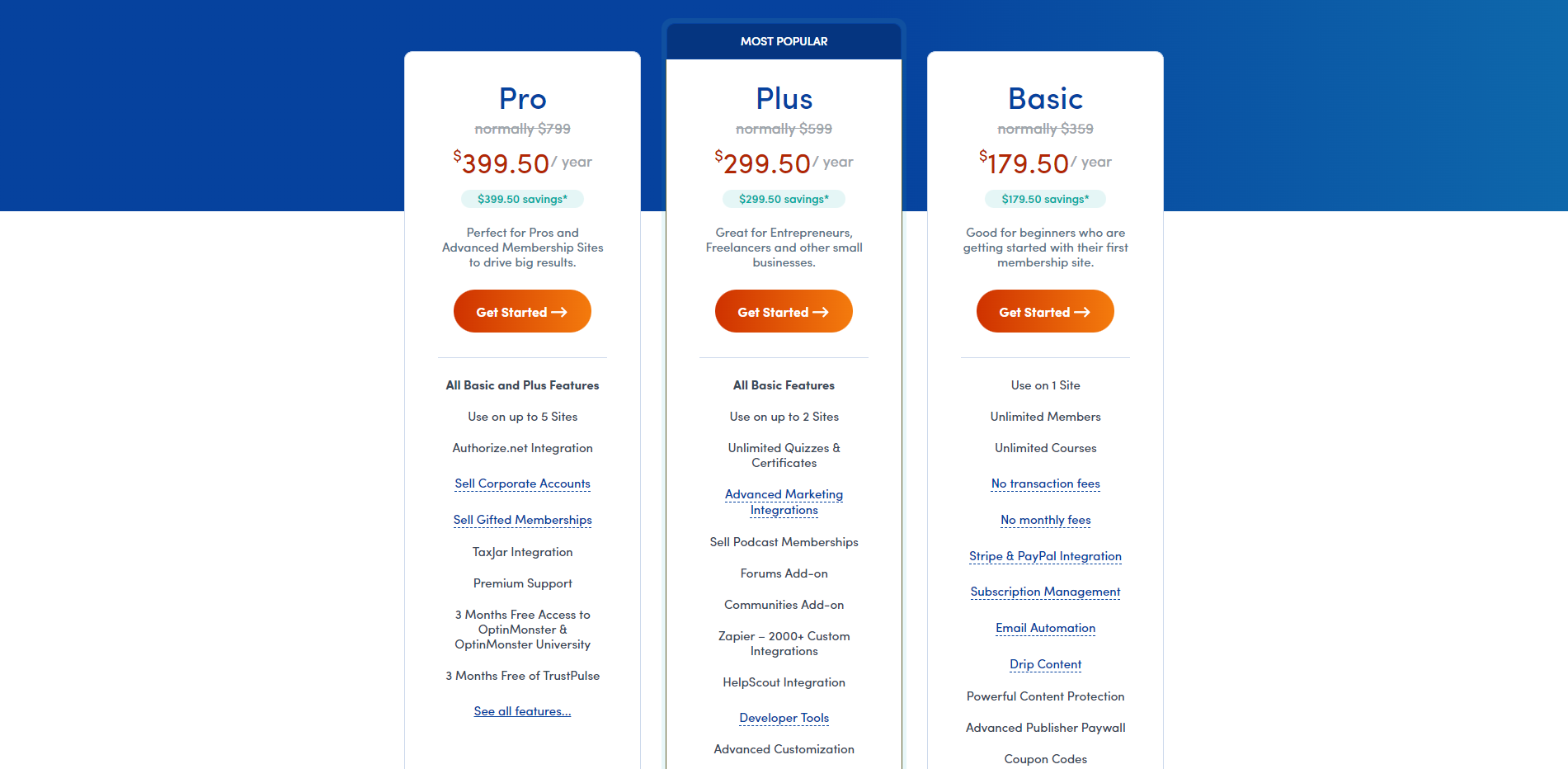
Basic ($179.50 per year) is ideal for beginners starting and exploring the perks of building their membership site.
If you already know your way around membership sites, consider upgrading to Plus ($299.50 per year).
And if you want to take things to the next level, the Pro plan ($399.50/yr) is ideal.
bbPress
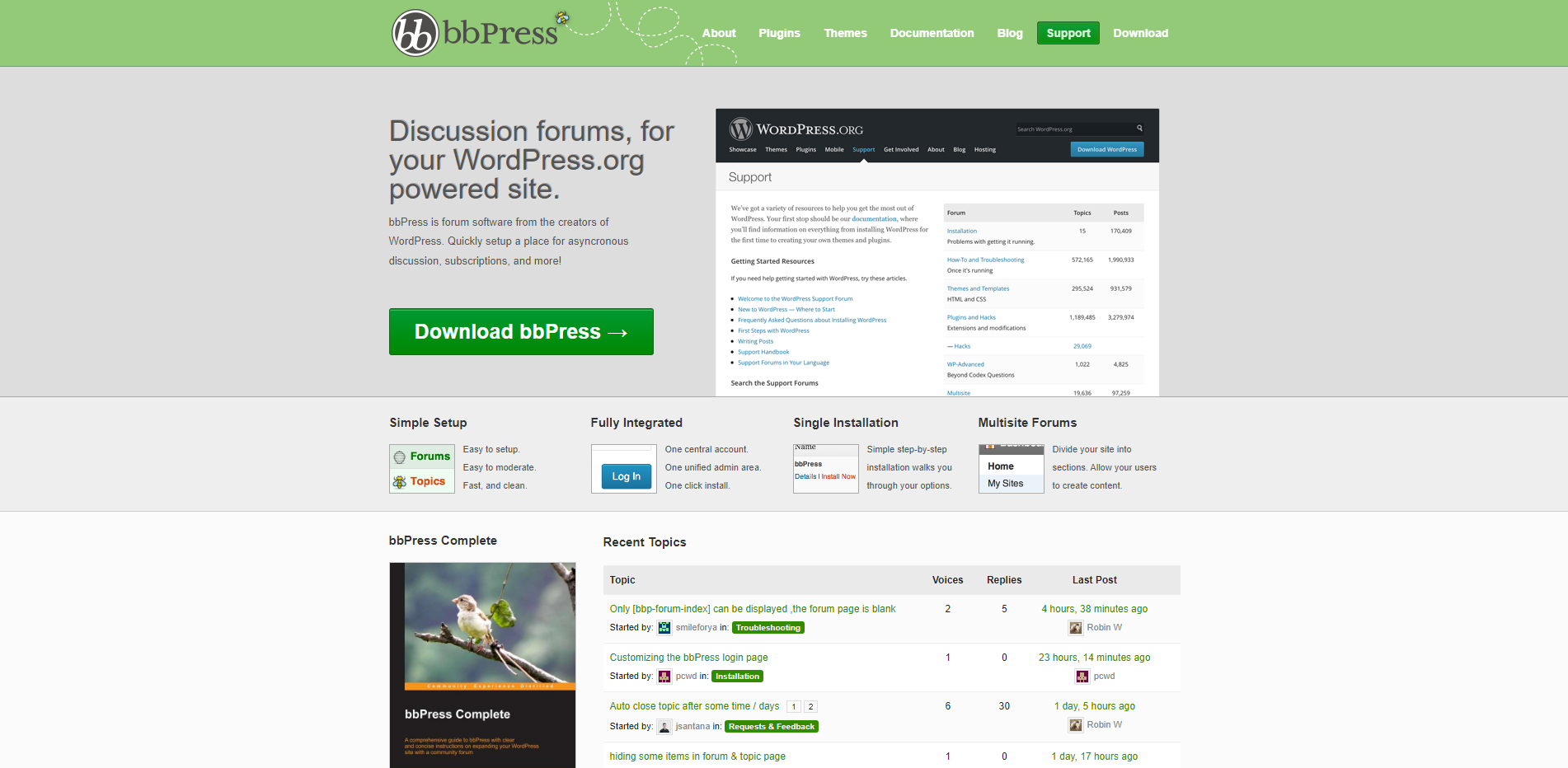
bbPress allows you to add a forum to your WordPress site.
What makes it one of the best WordPress community plugins? It’s a lightweight tool with a simple and clean interface! It’s also easy to use and customize.
To use bbPress, install and activate the plugin on your WordPress site. Then, you can create and manage discussion forums. You can also moderate content and manage member accounts.
It includes tools for integrating with other WordPress plugins and themes. You can also use it to manage forum data.
Features
- Forum creation and management – bbPress allows you to create and manage discussion forums on your WordPress site. You can create multiple forums and sub-forums. In addition, you can organize them into categories.
- User profiles – It lets users create and manage profiles.
- Private messaging – bbPress includes a private messaging system. And because of it, users can send personal messages to each other.
- Subscription options – It lets members of the online community subscribe to forums or threads to receive notifications when new content is up.
- Integration with WordPress – bbPress works well with the rest of your WordPress site and can be customized using WordPress themes and plugins.
Pricing
bbPress is a free WordPress forum plugin. You can download and install it like any other WordPress plugin.
BuddyBoss
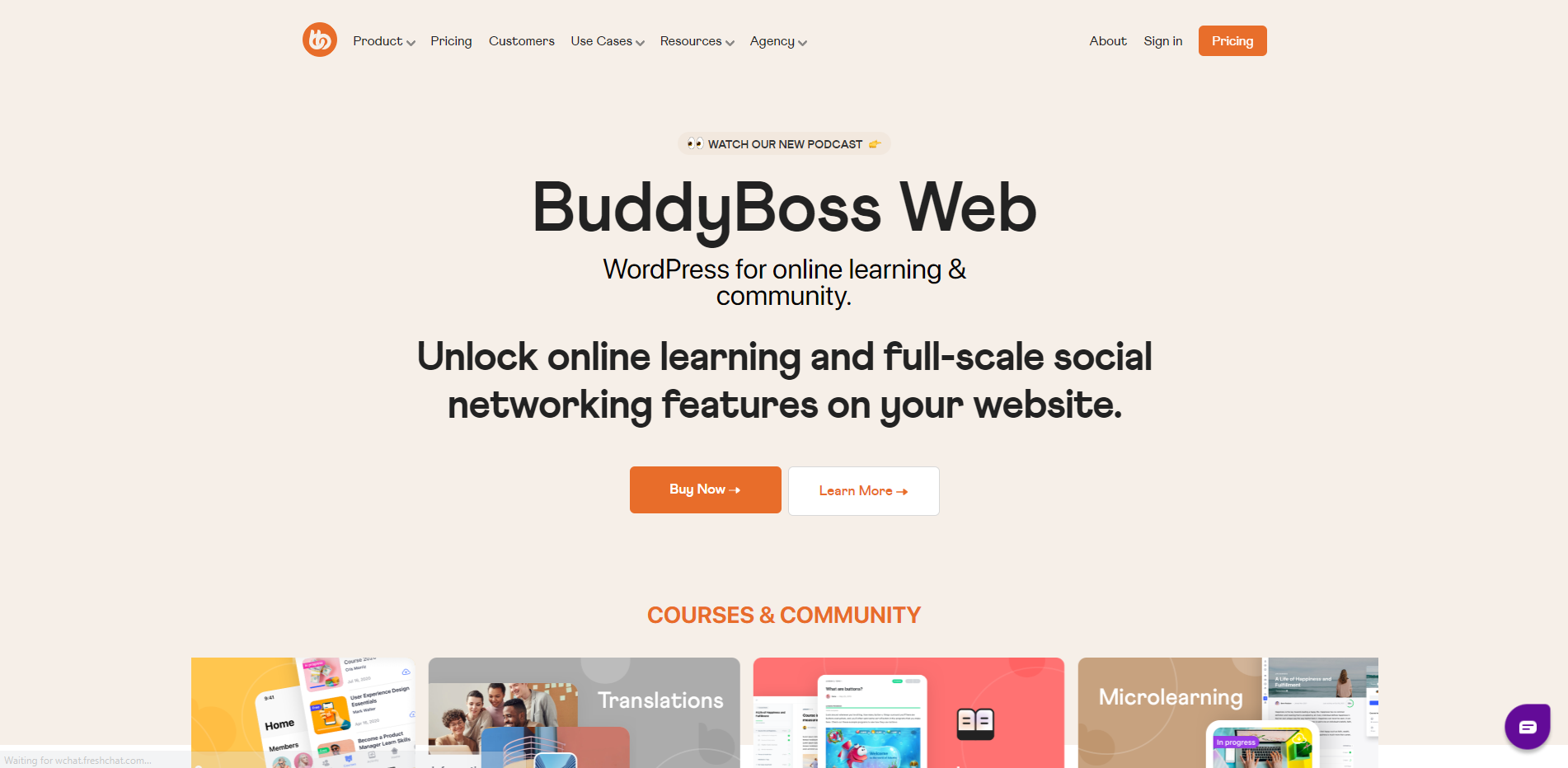
BuddyBoss is another best community plugin for WordPress that manages an e-learning website’s social functions. It focuses on bringing people together.
With it, you can strengthen your brand. You can connect members with like-minded people and get insightful comments. You can also inspire the community to share knowledge.
BuddyBoss enables your members to join in group discussions and receive incentives for their engagement. Additionally, selling access to your neighborhood can bring in money for your company.
Features
- Member profiles – It helps members customize their profiles and share the best details about themselves.
- Social networking features – It lets people organize themselves into like-minded groups.
- Private messaging – Because of this feature, BuddyBoss community members can communicate with one another.
- Album and media – It lets you help individuals and brands be more creative. You can do that by letting anyone upload photos and other media files.
- Monetization capabilities – It includes membership plugin integrations and one-time purchases. You can also use it for your WooCommerce store and sell memberships.
Pricing
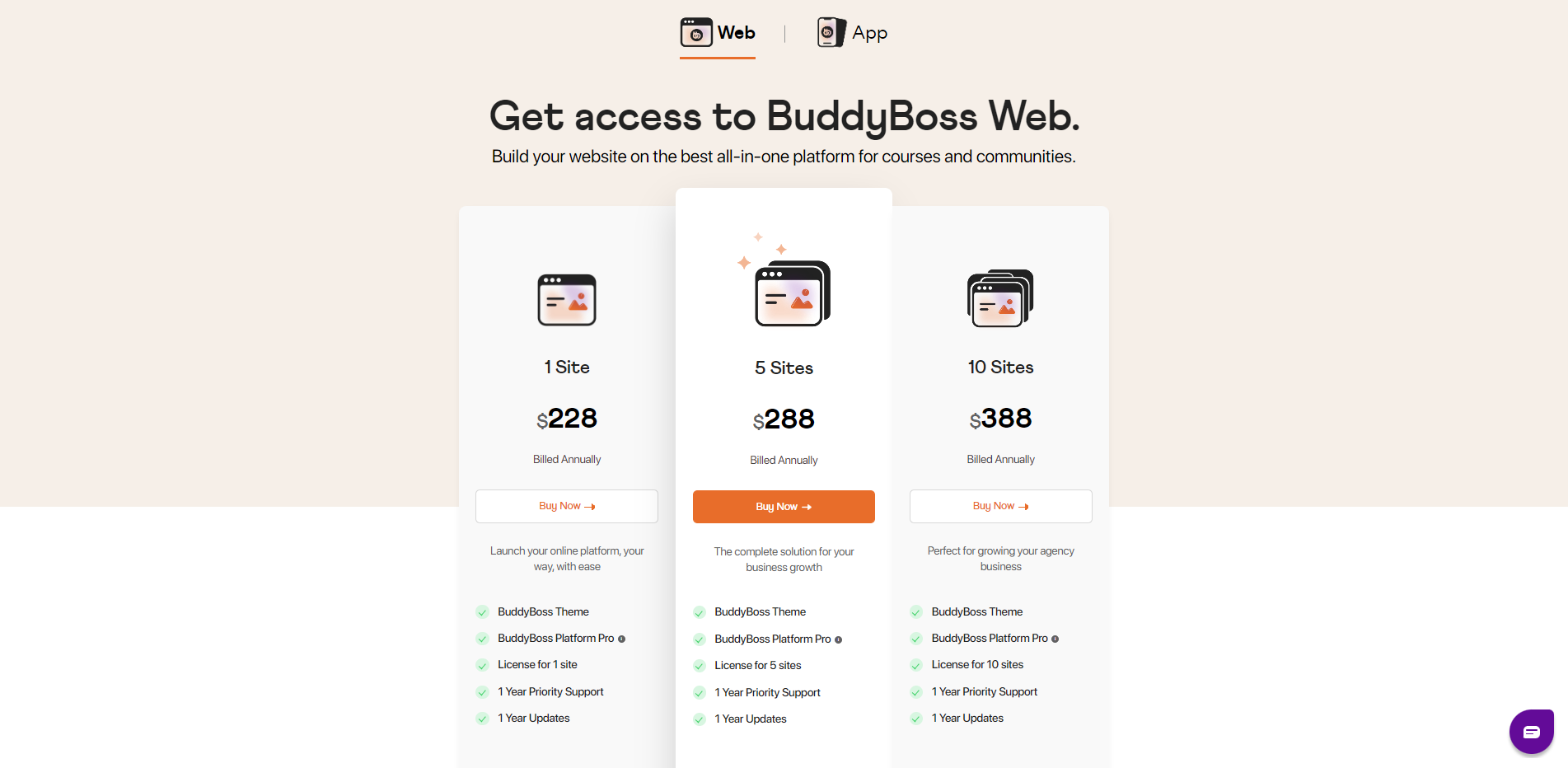
The BuddyBoss web subscription costs $228 for one site, $288 for five sites, and $388 for ten sites.
Meanwhile, the BuddyBoss App will be ready in February 2023 and comes in three plans:
- Standard at $219 per month
- Done For You at $219 per month (with a $1,999 one-time payment)
- Developer at $318 per month (with a $299 one-time fee)
It’s available as a web and app subscription.
A subscription to a web service typically refers to a service accessed over the internet through a web browser. Meanwhile, an app subscription typically refers to a service accessed through a mobile or desktop app.
PeepSo
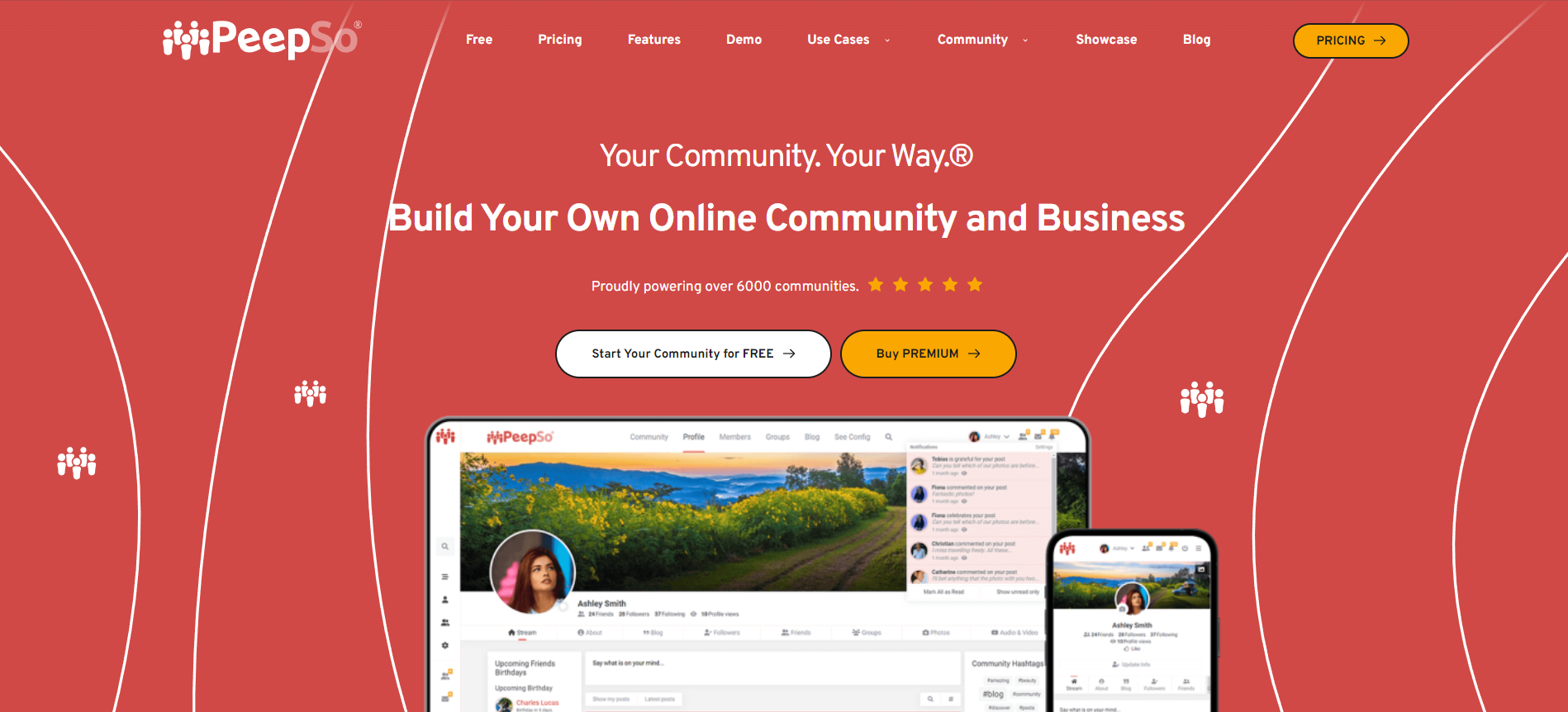
PeepSo is a social networking plugin. It allows you to create your private community on your WordPress site.
It’s easy to use and customize. It is also a fully responsive and highly flexible plugin. As a result, it will work well on desktop and mobile devices.
To use PeepSo, install and activate the plugin on your WordPress site. Once it is activated, you can start building your social network by adding users, creating groups, and setting up user profiles and activity streams.
You can also customize the look and feel of your social network by using the built-in theme customization options.
Features
- User profiles – PeepSo includes user profiles. As a result, it allows users to share information about themselves and communicate with other users.
- Activity streams – It features activity streams. And it lets users see what their friends are doing and post their updates.
- Groups – PeepSo includes group functionality. With it, people can create and join groups based on shared interests.
- Private messaging – It has a private messaging system that allows users to send messages to each other privately.
- Integration with WordPress – PeepSo works with the rest of your WordPress site. You can also customize it using WordPress themes and plugins.
Pricing
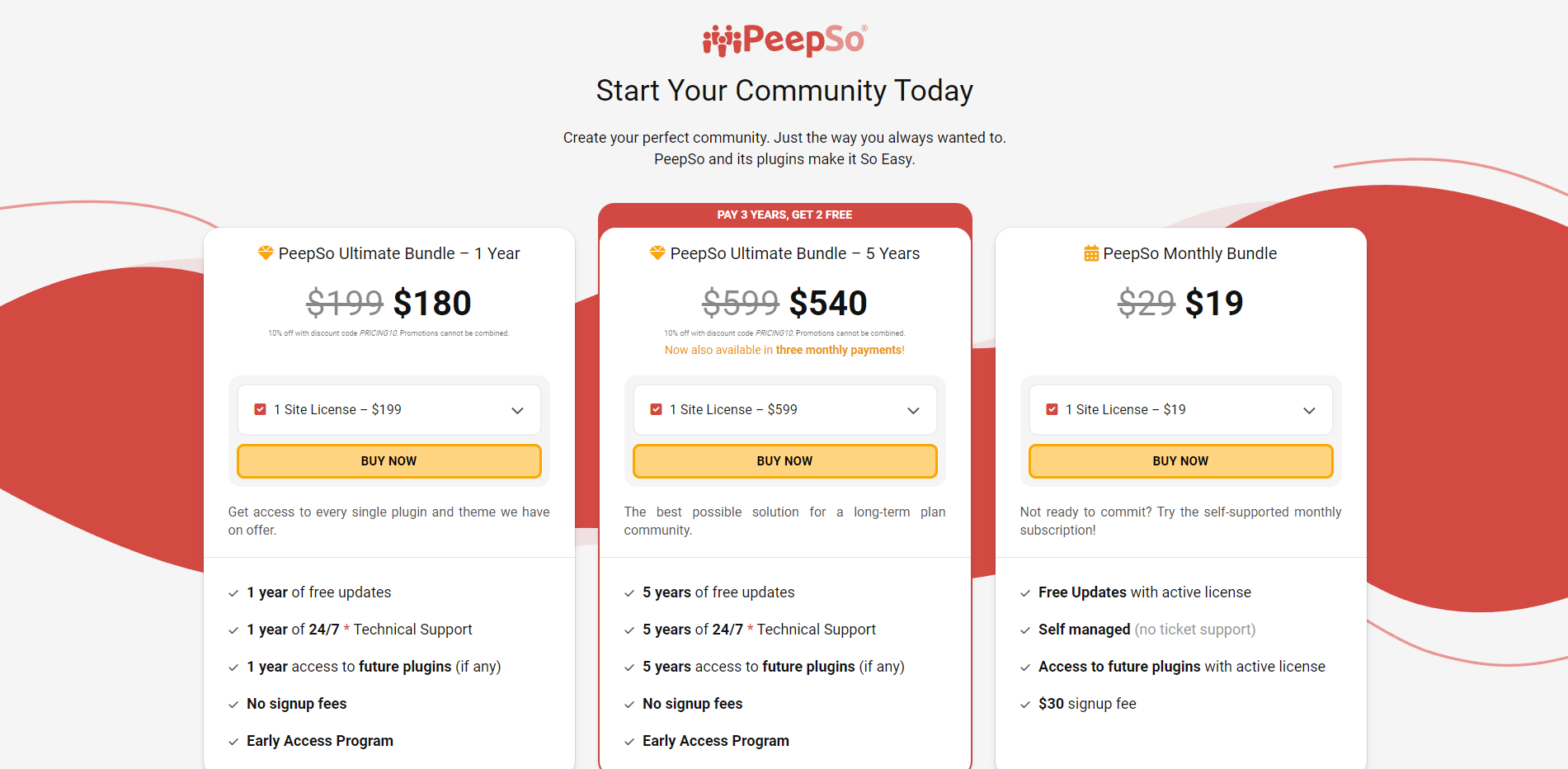
PeepSo is available in three plans:
- Monthly Bundle (at $19)
- Ultimate Bundle (at $180) – 1 year
- PeepSo Ultimate Bundle (at $540) – 5 years
Peerboard
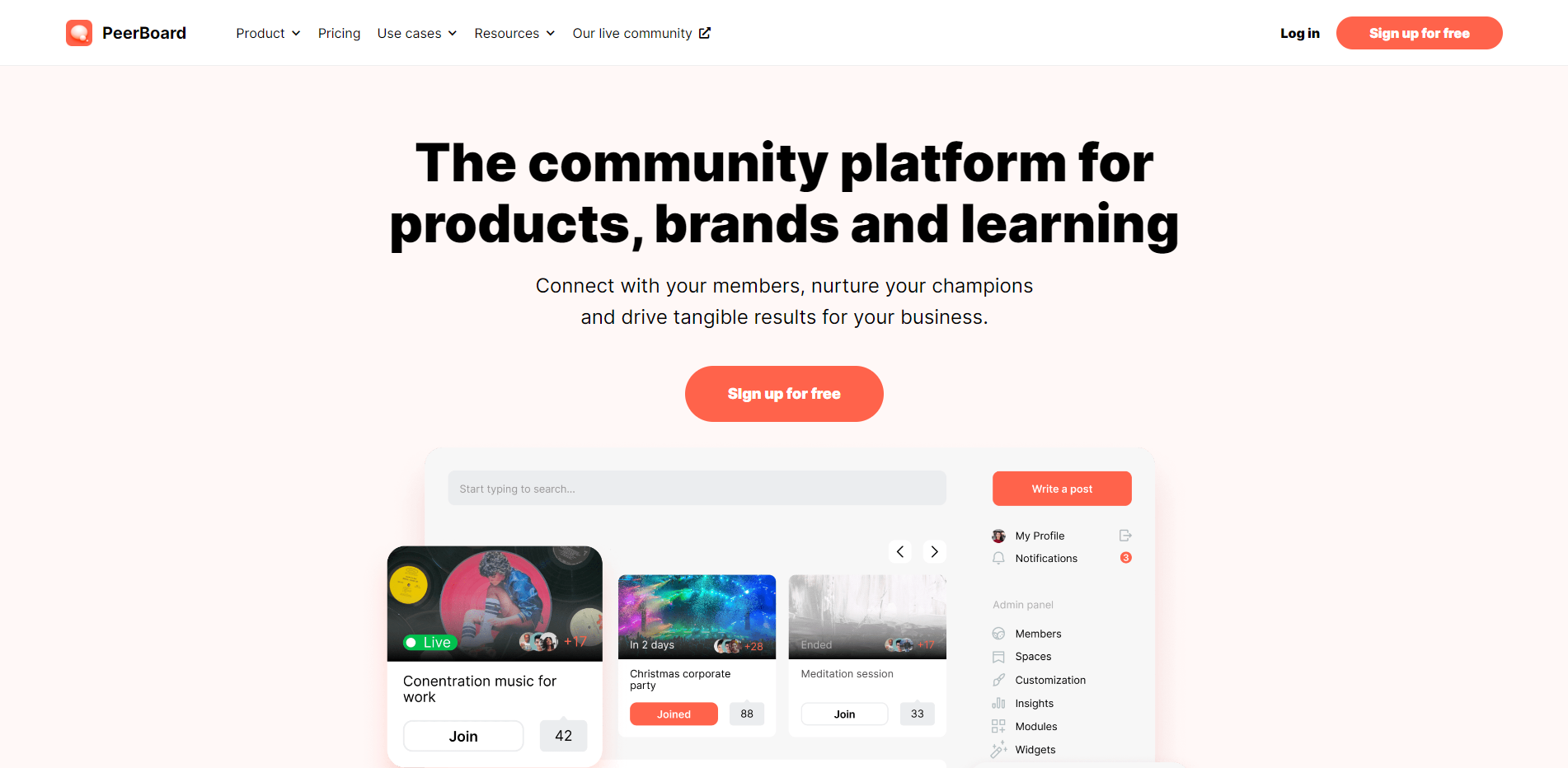
PeerBoard lets you create and manage online communities for your business, organization, or personal use – things that the best community plugin for WordPress does.
To use PeerBoard, create an account and set up your community on the PeerBoard website. Once your community is ready, you can invite users to join, create, and manage discussion forums. You can also use it to moderate content.
In addition, it comes with advanced features for managing member accounts and events. You can also analyze community data with it.
Features
- Discussion forums – It has discussion forums. And it lets users post messages and replies and take part in discussions.
- Polls – PeerBoard includes a poll feature. It allows users to create and participate in polls.
- Events – It allows you to create and manage events (like calendar syncing and RSVP tracking).
- Moderation tools – It features tools for moderating content. And it lets you delete or edit posts and threads. You can ban users, too.
- Integration with other tools – PeerBoard works well with other tools and platforms (like email marketing platforms, project management programs, and customer relationship management systems).
- Analytics and reporting – PeerBoard includes analytics and reporting tools. As a result, it lets you know what’s going on with your community. In addition, it helps you make data-driven decisions.
Pricing
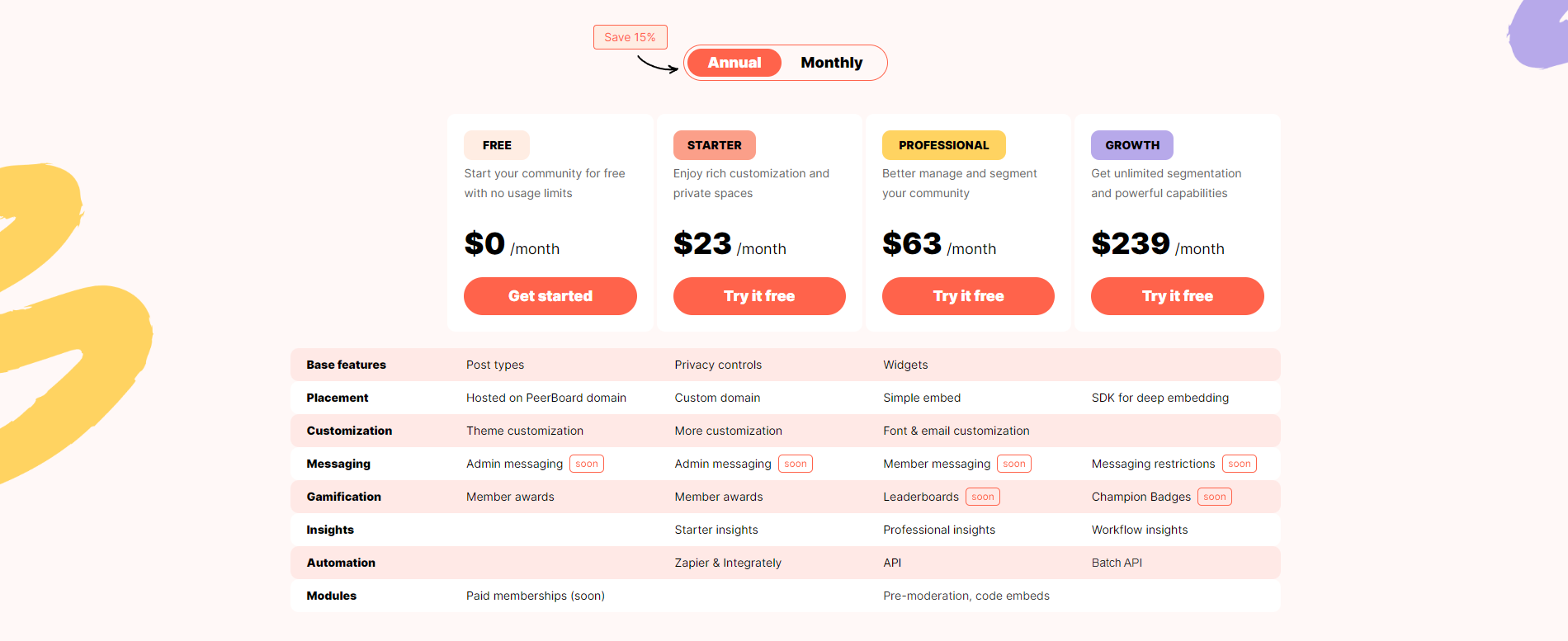
PeerBoard is available in four plans:
- Free
- Starter (at $23/mo)
- Professional (at $63/mo)
- Growth (at $239/mo)
Profile Builder Pro
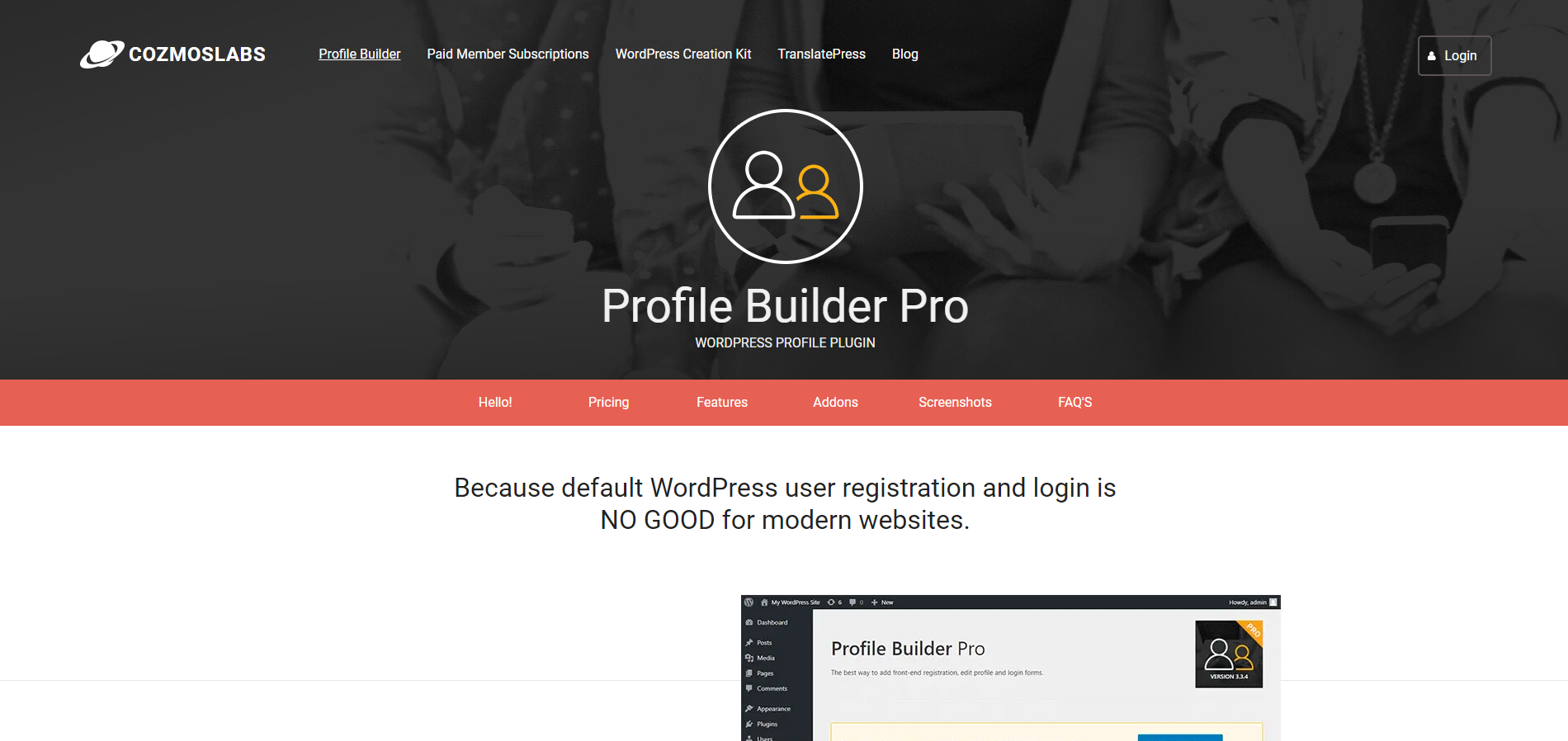
Profile Builder Pro allows you to create and manage user profiles on your site. It isn’t a community plugin per se.
However, it helps readers set up the profile pages of their site members. Plus, it works with other community plugins.
Install and activate the plugin on your WordPress site to use Profile Builder Pro. Once it is activated, you can create user profiles and set up registration forms and user groups. You can also use it to manage user permissions.
In addition, it comes with tools for managing user accounts and analyzing user data. You can also use it well with other WordPress plugins and themes.
Features
- Custom fields – Profile Builder Pro lets you create custom fields for your user profiles. This way, you can collect any information you need from your users.
- Registration forms – It comes with tools for creating custom registration forms. And it lets you gather data during registration.
- User permissions – Profile Builder Pro includes tools for managing user permissions. As a result, it lets you control what users can and can’t do on your site.
- Integration with other plugins – It works with many WordPress plugins (like WooCommerce, BuddyPress plugin, and Gravity Forms).
- Customization options – Profile Builder Pro includes many customization options. As a result, it lets you control the look and feel of the plugin on your site.
Pricing
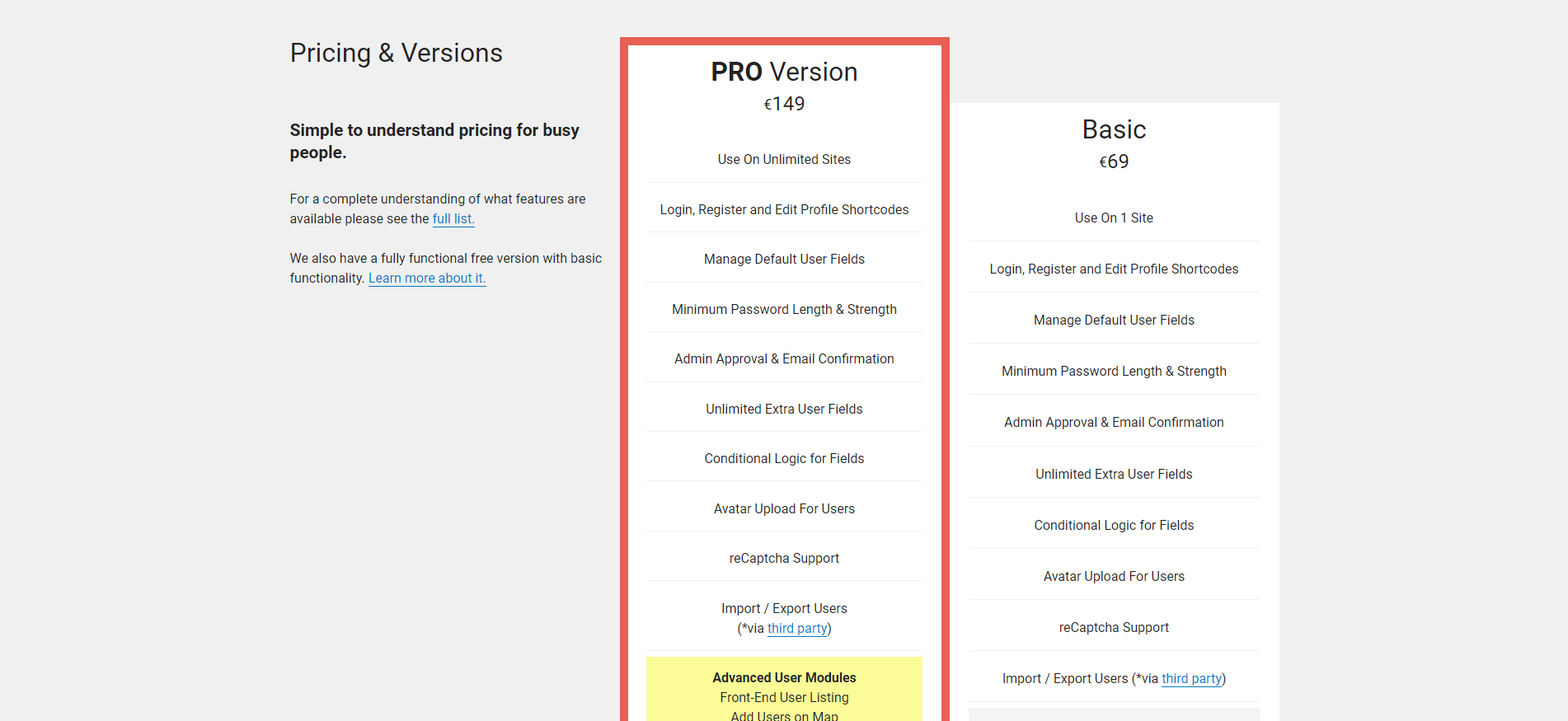
Profile Builder Pro is available in Basic for €69 for use on one site.
It also offers a PRO version for €149 for use on unlimited sites. This version is ideal for advanced users.
ProfileGrid
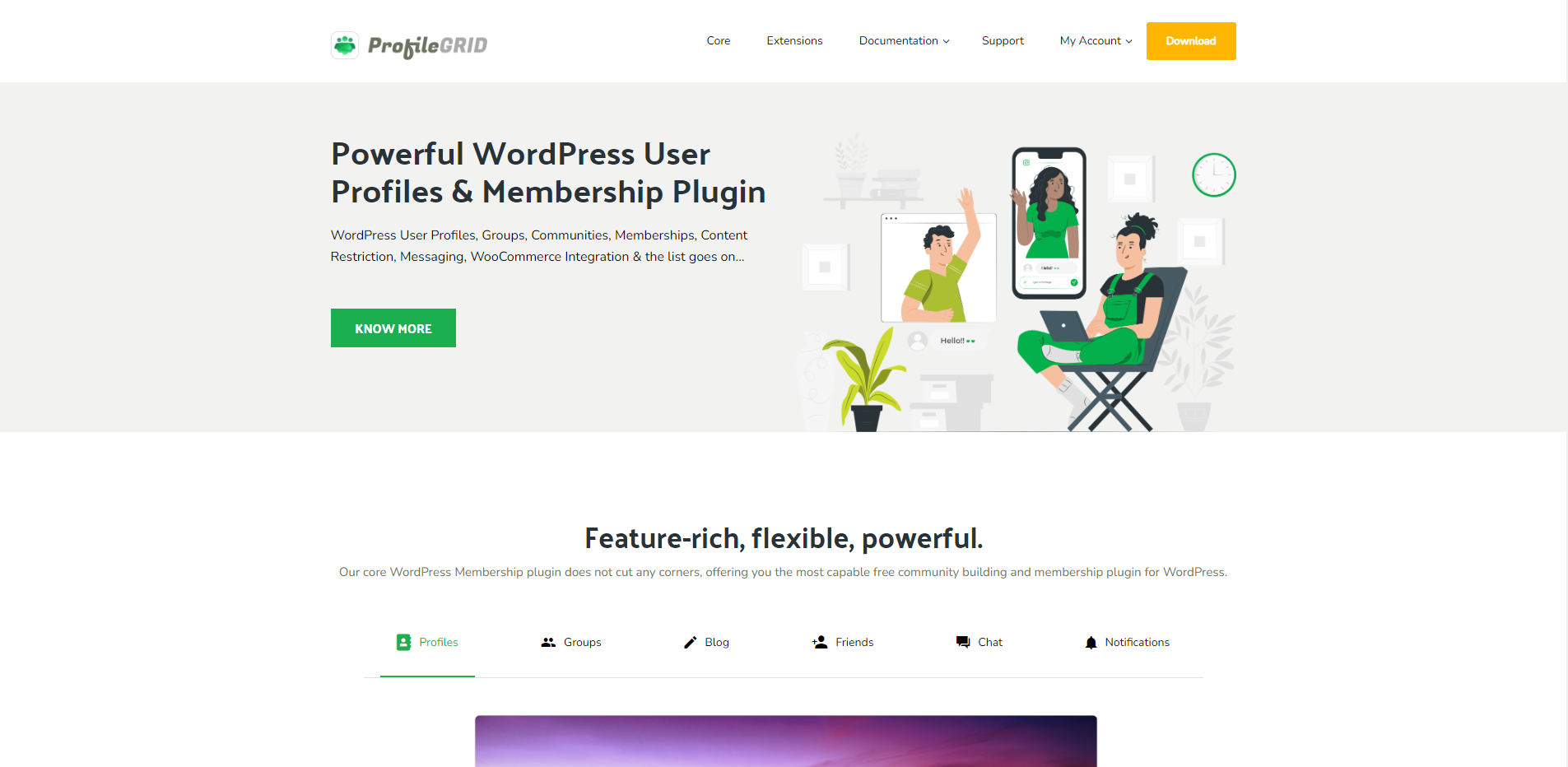
ProfileGrid is another one of the most popular community plugins out there, if not the best community plugin for WordPress.
It lets you create and manage user profiles on your site. And letting users work on their profiles is one of the best ways to build your own online community.
To use ProfileGrid, install and activate the plugin. Once it’s ready, you can create user profiles. You can also set up registration forms and user groups from there.
Do you also want to manage user permissions? Good news: the plugin lets you do it, too.
In addition, it includes tools for analyzing user data. And you can use it with other WordPress plugins and themes.
Features
- Custom fields – It lets you create custom fields. Because of that, you can get any information you want from users.
- Registration forms – ProfileGrid includes tools for creating custom registration forms. And because of it, you can also collect information from users during the registration process.
- User groups – ProfileGrid allows you to create and manage user groups. And it lets you organize users into different categories.
- User permissions – Among its notable features are the tools for managing user permissions. As a result, you have a say in what users can and can’t do on your site.
- Integration with other plugins – You can use it with many WordPress plugins like Gravity Forms and WooCommerce.
- Customization options – It includes many customization options. Because of these options, you can manage the look and feel of the plugin on your site.
- Multisite support – ProfileGrid supports WordPress multisite, so you can use it on multiple sites within a single WordPress installation.
Pricing
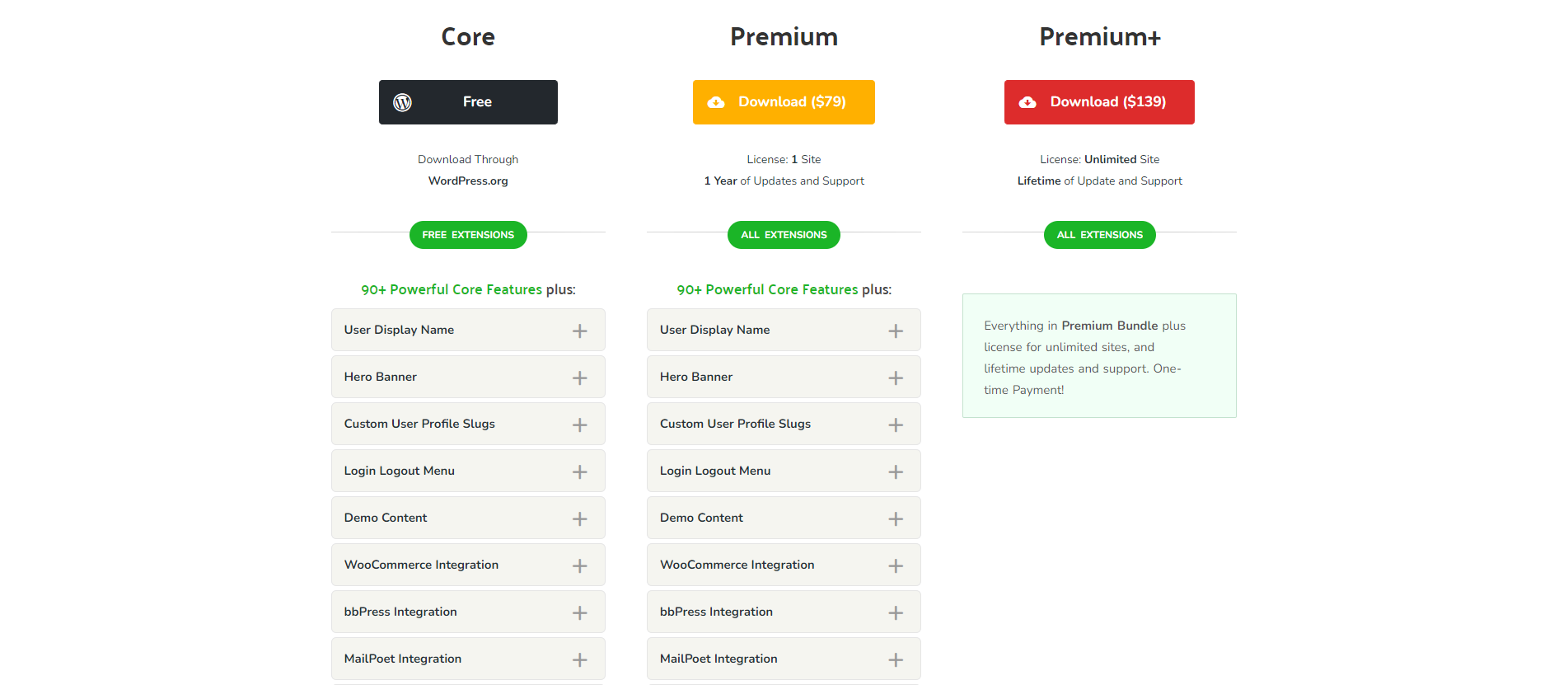
ProfileGrid is available in three packages:
- Core (free version)
- Premium (at $79)
- Premium + (at $139)
WPForo.com
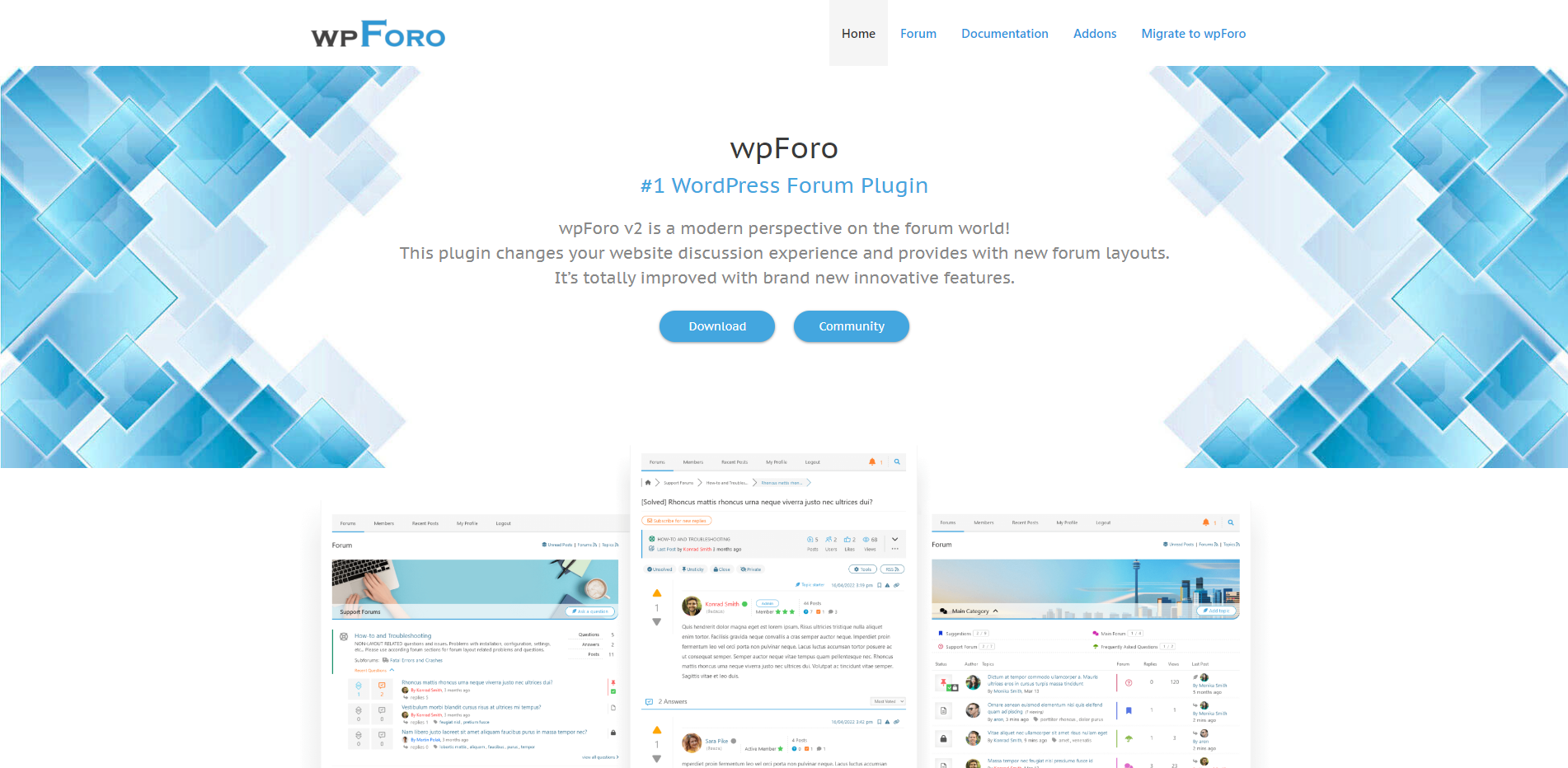
wpForo allows you to add a forum to your WordPress site.
To use wpForo, install and activate the plugin on your WordPress site. Once it’s ready, you can create and customize your forum. You can also create and manage discussion forums and moderate content.
In addition, wpForo includes tools for managing member accounts and analyzing forum data.
Features
- Customization – You can customize the look and feel of your forum. You can also fix the layout and structure of your forum to suit your needs.
- User profiles – wpForo allows you to create user profiles for your forum members. Members can upload an avatar and add a signature. They can also fill out a profile page with contact information and social media links.
- Notifications – It includes a notification system. As a result, it alerts members to new replies and topics. It can also bring the public’s attention to events and private messages.
- Moderation – wpForo includes tools to help moderate the forum. It allows you to move and split topics. It also lets moderators delete posts and ban users.
- Access control – You can control who can access different parts of the forum and set up user groups with different permissions.
Pricing
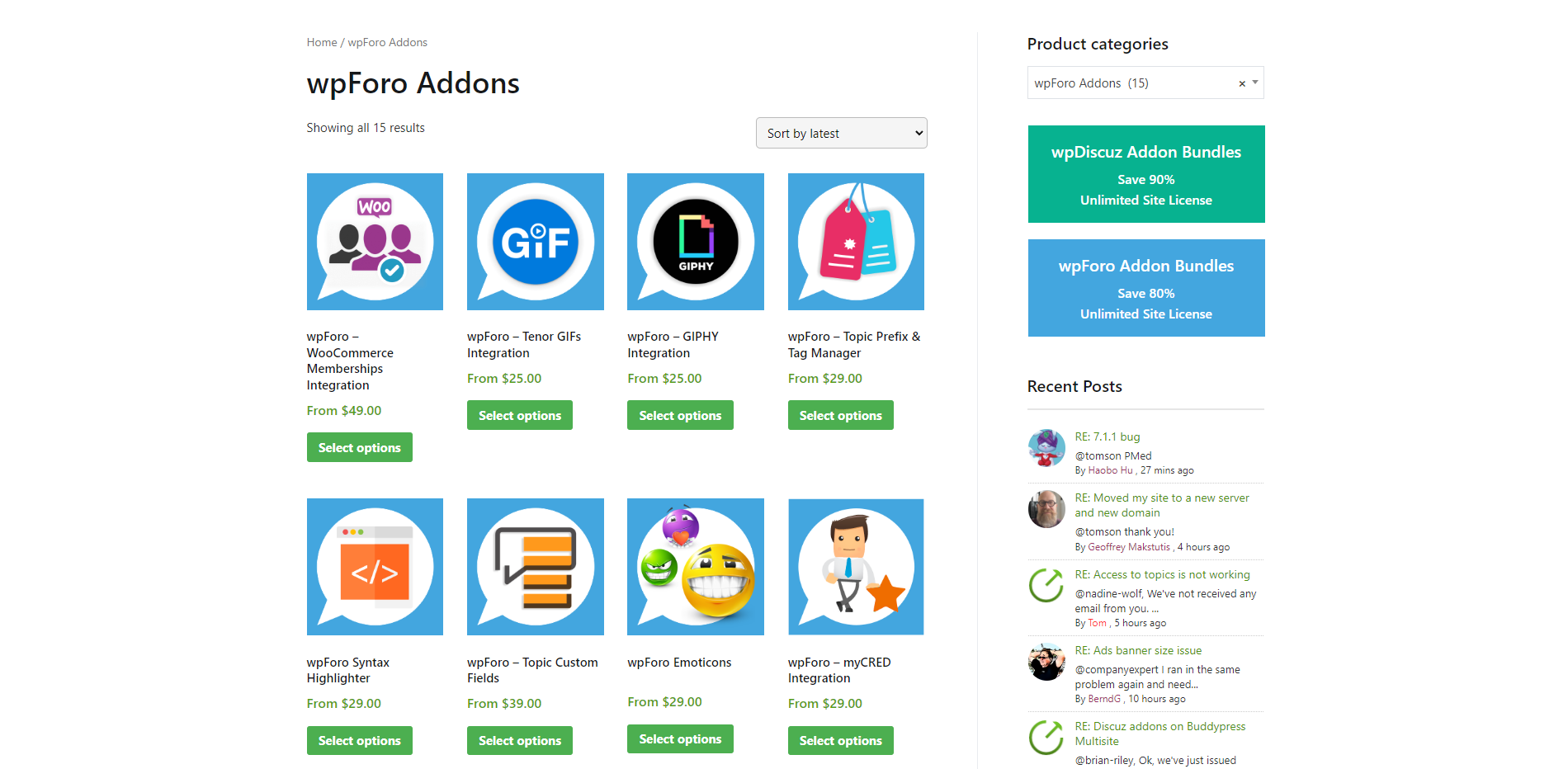
wpForo is one of the most popular free WordPress community plugins.
It’s free. However, it has premium add-ons. And you may want to buy them to double up on the plugin features for a better online community.
Below are some of the best wpForo add-ons.
- Private Messages – This feature allows community members to talk to each other.
- User Custom Fields – It lets you add form builder tools that match your layout – Account Settings form, Registration form, and more.
- Topic Custom Fields – You want this add-on if you need to create forms for different user groups and forums.
In addition, wpForo comes with Addon Bundles for unlimited sites. It’s best to get this if you plan to purchase add-ons for several sites.
- Addons Basic Bundle (for $190) – It features the above add-ons. And it includes wpForo Emoticons, wpForo Polls, and wpForo Topic Prefix & Tag Manager.
- Addons Full Bundle (for $290) – It includes extra add-ons like wpForo Blog Cross-Posting, wpForo Giphy Integration, and wpForo WooCommerce Memberships Integration.
Youzify
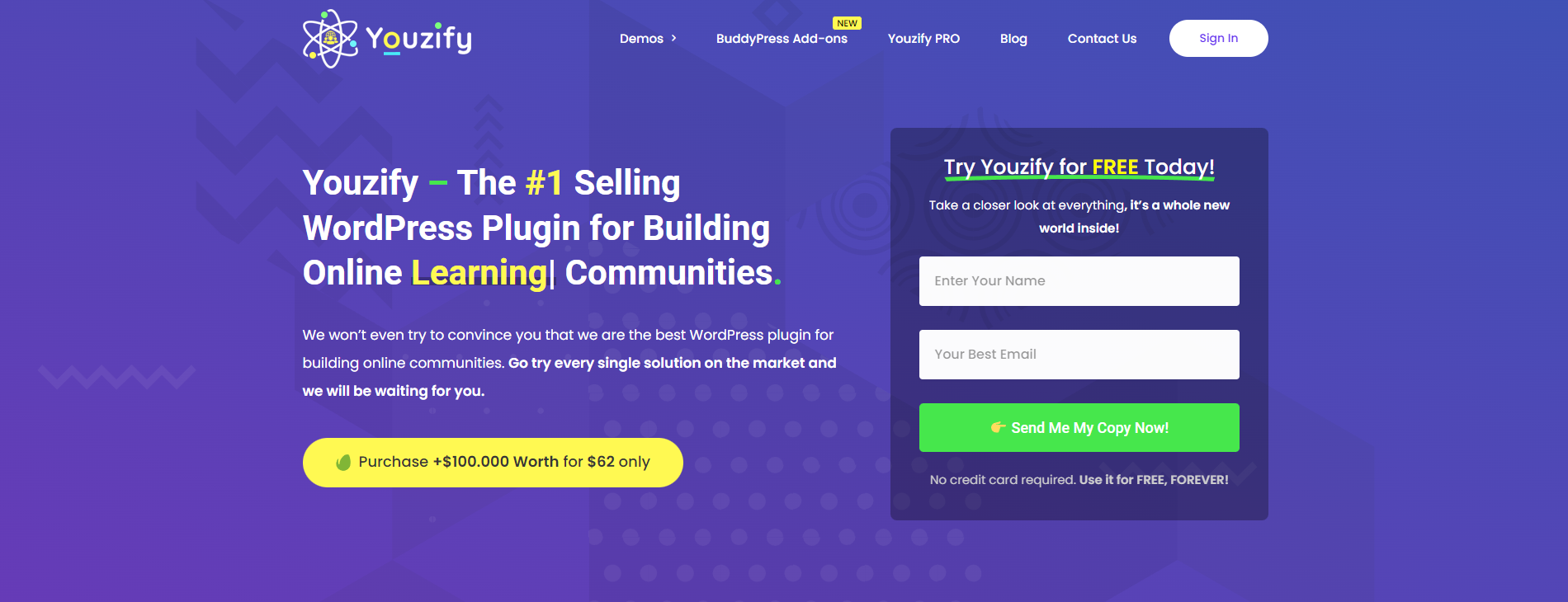
Youzify is a popular WordPress user profile plugin. It’s a feature-rich and advanced community plugin.
Many people use it as a user profile management solution and allow others to tweak their profiles.
What makes the public love it? It can deliver a one-of-a-kind brand experience!
Features
- User profiles – It includes 14 header styles and 20+ profile widgets. If you have a verified account, you can also use the unlimited ads widget.
- Community social functions – Friend connection and private messaging features can strengthen community members’ bonds.
- Membership features – Youzify includes Social Login, captcha systems, and front-end settings.
- Directory – It lets you feature a global news feed. You can also show a group directory.
Pricing
Secure a regular license for Youzify at $49. The deal covers future updates and six months of support (KaineLabs).
So What’s The Best Community Plugin for WordPress for You?
The answer will depend on each user. And it should be one that can take your site to another level – from ordinary to extraordinary.
Personally, Memberpress’s extensive features for building a WordPress community website and its reasonable pricing make it hard to top.
With it, you can engage with users and create a community website for developing lasting relationships. It also builds trust and improves customer satisfaction.
Aside from helping you with your site’s engagement rate, it should also help you collect information. And it should let you gather user feedback and support (to those who decided to be part of your community).
If you’re looking for a free community plugin, bbPress is for you. It’s as simple and straightforward as it gets, but you can get it at no cost to you.
Again, these are just my recommendations. It ultimately depends on your needs, wants, and budget.
This is why we narrowed the list above to help you find the best WordPress community plugin. Happy hunting!
WORDPRESS
Our CloudFest Hackathon Report – WordPress.com News

With WordPress today you need to use custom code or a plugin to create a custom post type like “Book” or “Member.” This is a popular need, and there are a variety of approaches; however, one challenge is that the end-user experience can be confusing and non-standardized.
A few weeks ago, some Automatticians and I went to the 7th CloudFest Hackathon in Rust, Germany to explore a solution for this. We started hacking on a deeply nerdy project, JSON Schema forms and fields, and ended up with a fascinating approach to an age-old question: What if you could register custom post types and custom fields directly in the WordPress admin?
Forty-eight hours turns an idea into reality
The CloudFest Hackathon is an event that allows developers from around the globe to take ideas and turn them into realities.
During the Hackathon, teams of developers from various content management systems and hosting companies come together to contribute to projects that align with the core principles of the event: the projects must be not-for-profit, interoperable, and open source.
Last year, we worked on a project that allowed us to embed WordPress directly in VS Code. We built the WordPress Playground VS Code extension on top of WordPress Playground. It uses WebAssembly to run WordPress entirely within the browser, and it turned out pretty darn slick.
This year, we focused on a JSON Schema Field/Form Renderer. While most of us explored using JSON Schema to dynamically register admin forms and fields, Dennis Snell and Adam Zieliński decided to take the project one step further! They hacked together a plugin that introduced the ability to register custom post types and custom fields directly from the WordPress admin. More notably, everything happens within the block editor—you have to see it to believe it:
This work poses some interesting possibilities for custom post type and custom field implementation because it could fundamentally change the way low- to no-code WordPress users modify their sites.
Naturally, I took the idea to Twitter/X:
I got quite a range of responses, ranging from “Heck Yes! It should have already been a core feature now. Such an integral part of every other site” to “Admin should only be for content and user management. Everything else should be configured in code and version controllable.”
So why the range in responses? Let’s discuss.
It turned out to be pretty simple
Dennis and Adam built our prototype using the following conventions:
- A custom post type
wp_data_typeholds templates for user-defined data types. - The title of a post in the
wp_data_typedefines the name of the new data type. The post itself is the rendering template and comprises any set of normal blocks. Names are given to select block attributes within the post, and these names are mapped into the data type. - When creating new posts for the given data type, the locked template is copied from the
wp_data_typetemplate, and the block attribute annotations are preserved. - Finally, when rendering the
wp_data_typetemplate, the attributes are pulled from the individual post of the given data type and spliced into the template.
The fascinating idea is that we don’t have to think about form fields; blocks already provide a rendering view and a modal editing experience. We can rely on the fundamental way blocks work and use the very same user experience to create custom data types in a way that users are already familiar with when editing a post or a site.
Custom post types define custom data types, so we use a template to not only define the data type, but also to provide a default rendering template. Each data attribute within a post type has a field where it’s possible to define that field with its JSON-LD property.
For example, say you had a “Book” custom post type. A few JSON-LD properties you could define using custom fields are:
descriptioncopyrightYearauthorbookEditionbookFormatisbnnumberOfPages
We also chose to store a copy of each block attribute in the JSON attributes for that block. Since WordPress can now provide a post-to-JSON function, which merges the extracted attributes with the names assigned in the custom post type template, that template may have changed since the custom post was created. This means that no database migrations are necessary to render an updated version of a post.
The best part? The WordPress infrastructure that already exists (aka Gutenberg!) defines the data type. Because these custom posts are normal posts, and because they adopt the locked template for the data type definition, they are, in fact, renderable on their own! Even if the template has been updated and only the post itself is rendered, it will still display a meaningful representation of the data type as it was when it was created.
While our original Hackathon project was tailored towards developers and UX designers who would love to see a forms and fields API in WordPress, this prototype puts more power in the hands of low- to no-code WordPress users.
It also opens up a world of possibilities for providing a rendering view for any structured data. Imagine uploading a CSV and mapping the column names to block attributes, or connecting to a database or JSON API to map the records in the same way.
For example, if you had a CSV with business names, addresses, a rating, and a description, we could take that template post and insert a map block, a heading block, a star rating block, and a paragraph block and set the attributes to map to the CSV columns. It’s essentially an instant structured data renderer!
But even if we can define custom post types and fields in the editor, should we, as a WordPress community, consider adding it to core?
The existential question: Should it exist?
Adding this kind of functionality into WordPress core could open up a ton of opportunities for the average WordPress user. Instead of needing to get a developer involved to add a custom post type to their site, a user could simply do it themselves and define the necessary fields and structured data attributes.
On the other hand, allowing everyday users, who may not have a full grasp of how custom post types and structured data should work, free reign to create these data types themselves could have detrimental effects on the user experience of their websites. Clunky or incorrect implementation of structured data markup could also cause issues with how search engines crawl these sites, causing unintended negative impacts to search traffic.
Not only that, but as of right now, if a custom post type is accidentally deleted, all of the content posted to that custom post type will no longer be accessible through the admin (even though it will still be stored in the database). The user could think they “lost” their data.
Let’s talk about it
What do you think? Are you in favor of giving website owners the ability to change and customize their custom post types and attributes? Or are there some website features that should always require a more technical hand and implementer?
We’d love to chat with you about your thoughts in the comments below.
For another interesting exploration on a related idea, check out this discussion on GitHub with the core team.
Thanks to Lars Gersmann for leading the JSON Schema project with me and to everyone on the Syntax Errors team: Adam Zieliński, Dennis Snell, Julian Haupt, Michael Schmitz, Anja Lang, Thomas Rose, Marko Feldmann, Fabian Genes, Michael Schmitz, Jan Vogt, Lucisu, Maximilian Andre, Marcel Schmitz, and Milana Cap.
Join 110M other subscribers
WORDPRESS
Turkish startup ikas attracts $20M for its e-commerce platform designed for small businesses

It’s easy to assume the e-commerce ship has sailed when you consider we have giant outfits like Shopify, WooCommerce and Wix dominating the sector. But the opportunity for e-commerce platforms that cater to brands remain vast and fertile, since so many smaller businesses continue foraying into the internet in the wake of the pandemic.
Further evidence of this has surfaced in the form of one of the largest fundraises by a startup in Turkey, given that the average Series A usually comes in at below $15 million. E-commerce platform ikas has raised $20 million in a Series A funding round as it seeks to expand its operations into new markets in Europe. The company currently operates in Turkey and Germany, and says its platform simplifies store management for companies that want to have a digital presence.
The investment was led by the International Finance Corporation (IFC) fund, a venture arm of the World Bank Group.
ikas’ co-founder and CEO Mustafa Namoğlu told TechCrunch that the company would be using the new funding for international expansion in Eastern Europe and the DaCH region.
“Most of Europe is predominantly neglected or underserved by those U.S.-based giants,” he said. “The global platforms lack customer service in local languages. It looks easy to start with, for example, a Shopify. But once you start, you need to add other plugins, and you may even need an agency to run it.”
Namoğlu said ikas can win customers against other platforms because it’s more of a “fire and forget” platform. “The first reason our merchants pick us over others is storefront speed, which gives them higher conversion rates. You get this out of the box, even if you pay us €30 per month. The second reason is customer service. Thirdly, we bundle the payments and the shipping labels into our core product, which means you don’t need to go and negotiate with payment providers or shipping labels. You’re immediately ready to go,” he said.
Namoğlu previously founded MUGO, a fashion distribution and retail company, and launched ikas in 2017 with co-founders Tugay Karaçay, Ömercan Çelikler and Umut Ozan Yildirim.
The IFC invests directly in companies as well as through PE and VC funds.
Also investing in ikas is Re-Pie Asset Management, which has grocery delivery startup Getir in its portfolio. The round saw participation from ikas’ existing investor Revo Capital, best known as the first institutional investor in Getir, Param, Midas and Roamless.
WORDPRESS
Introducing the Public Pattern Library – WordPress.com News

When it comes to website-building, WordPress themes set your site up for success by providing stylish, preselected options for fonts, colors, and layouts. Even though themes provide the overall aesthetic, you still need to build out the posts, pages, and templates on your site. That’s where block patterns come in!
The WordPress.com Pattern Library is your new go-to resource for finding any kind of pattern for your beautiful WordPress website. With hundreds of pre-built patterns to choose from across over a dozen categories, you’ll be covered no matter your website’s specific needs.
What are patterns?
Block patterns are collections of blocks made to work seamlessly with our modern themes. Need an “About” page? Check. A gallery? Check. A testimonial? Check. How about a newsletter? Check. We have just about anything you’ll need.
Best of all: for each pattern, the fonts, colors, and spacing will adapt to your theme’s settings, making for a cohesive look. Still, patterns aren’t locked or static either—after you’ve added the pattern to your post, page, or template, you can tweak it however you like.
A tour of the Pattern Library
This new public Pattern Library allows you to browse, preview, and easily share or implement whichever design speaks your tastes. Let’s take a look around.
Browse all categories
If you want to explore the Pattern Library and don’t have anything in particular that you’re looking for, click through each category to spark some ideas.
Search for what you need
At the top, you’ll find a fast and easy-to-use search box, allowing you to find exactly what you need. This is a great option if you don’t feel like browsing and want to jump right into a solution for your specific needs.
Explore page layouts

Sometimes you just need the components of a post, page, or template: a header, a “Subscribe” box, a store module, etc. Other times, you want to be able to copy and paste an entire page into existence. Scroll down past the categories and you’ll find our full-page patterns for whole pages: About, Blog, Contact, Store, and more.
Test the mobile responsiveness for each pattern
When looking through the library on a desktop or laptop device, you’ll see a gray vertical bar next to each pattern. That’s a nifty little slider that we’ve built into the library which allows you to see how each pattern responds to different screen sizes. Using your cursor to move the bar to the left, you’ll see what that design looks like on a mobile device; in the middle is where most tablets fall; and scroll back all the way to the right for the desktop/laptop version.
Copy and paste to your website
Like what you see? Simply click the blue “Copy pattern” button, open the WordPress.com editor to the post, page, or template you’re working on, and paste the design. It’s that easy. Once inserted, you can customize each block as needed using the right sidebar.
Your new favorite page-building tool
The Pattern Library is especially useful if you build websites for clients. Each pattern is built to work with any theme that follows our technical standards, speeding up page-building not just for you but also for your clients—all while maintaining the overall style of your theme.
In concrete terms, this means that our patterns take font, color, and spacing settings from the theme itself rather than using standard presets. This makes it far less likely for a site to break (or just look off) when you—or a client—experiment and make updates.
Our goal is always to make your life both easier and more beautiful. This new resource does just that. Check out the WordPress.com Pattern Library today to enhance your website-building experience!
Join 109.9M other subscribers
-

 WORDPRESS6 days ago
WORDPRESS6 days ago10 WordPress Influencers to Follow in 2024 – WordPress.com News
-

 SEARCHENGINES7 days ago
SEARCHENGINES7 days agoGoogle Image Search Adds Pixel Level Object Segmentation Animation
-

 MARKETING7 days ago
MARKETING7 days agoFeeling Stuck: What to Do When You Don’t Know What to Do
-

 PPC5 days ago
PPC5 days agoA History of Google AdWords and Google Ads: Revolutionizing Digital Advertising & Marketing Since 2000
-

 SEARCHENGINES6 days ago
SEARCHENGINES6 days agoMore Google March 2024 Core Update Ranking Volatility
-

 PPC6 days ago
PPC6 days agoCompetitor Monitoring: 7 ways to keep watch on the competition
-

 PPC5 days ago
PPC5 days ago31 Ready-to-Go Mother’s Day Messages for Social Media, Email, & More
-

 WORDPRESS6 days ago
WORDPRESS6 days agoThrive Architect vs Divi vs Elementor










You must be logged in to post a comment Login